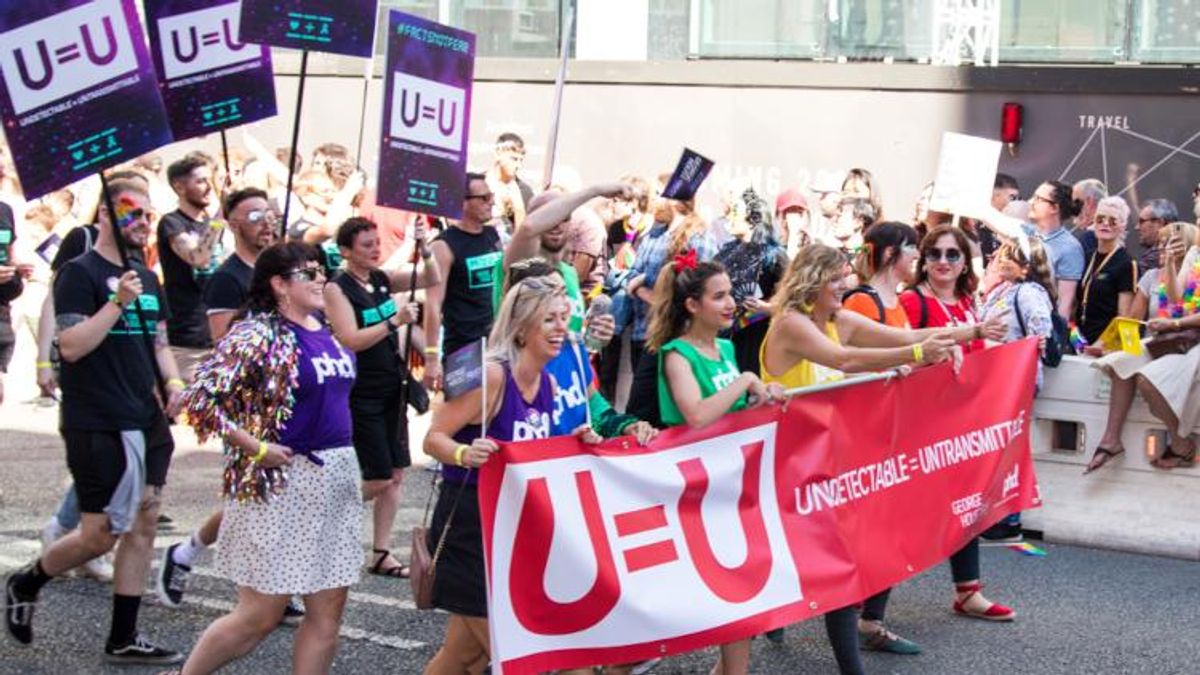Like all of 2021, the summer of 2016 was a tumultuous, anxiety-inducing time. There was a highly contentious election and, for the LGBTQ+ and Latinx communities, a searing tragedy with the Pulse massacre. Amid the stressors was a huge dose of positivity: the birth of a movement called U=U, or undetectable equals untransmittable.
On July 21, 2016, a group of accomplished doctors, activists, and scientists in the global HIV sphere — including the current director of the Division of HIV/AIDS Prevention for the Centers for Disease Control and Prevention, Dr. Demetre Daskalakis — penned a consensus stating that a person living with HIV who is on antiretroviral therapy and who had achieved an undetectable viral load could not transmit the virus to others. Titled, “Risk of Sexual Transmission of HIV From a Person Living With HIV Who Has an Undetectable Viral Load,” the statement was backed up by a litany of quotes, sources, and explanations. The consensus would become known as “Undetectable Equals Untransmittable,” or “U=U,” and would eventually be endorsed by thousands of health and HIV organizations around the globe.
The Prevention Access Campaign, which organized the consensus, has continued to spread its message, advocating for the lessons of U=U to be standard practice in all HIV care. Bruce Richman, founder and executive director of the campaign, believes U=U can not only chip away at HIV stigma but give a sense of freedom and empowerment back to those living with the disease.
“Now that this community has verified U=U, we’re working on every continent to ensure it’s widely known,” Richman says. “And we’re advocating for people with HIV have to have access to the treatment and care to stay healthy and not have to worry about passing on HIV ever again.”
In five years, PAC and other U=U advocates successfully lobbied established health organizations like the CDC, the World Health Organization, and UNAIDS to endorse U=U and update their assessments of HIV “risk.” Richard Wolitski, then director of the Office of HIV/AIDS and Infectious Disease Policy at the U.S. Department of Health and Human Services, gave U=U a big boost in 2017 when he wrote an op-ed for TheBodyPro about the nascent movement.
“These study results are a game changer for HIV prevention, care, and treatment,” Wolitski wrote. “They are also radically changing how many people living with HIV see themselves, how they are seen by others, and relieving them of the psychological burden of the fear that they might inadvertently infect someone they love.”
The former HIV czar also commended the grassroots effort of PAC and the activists behind it: “These scientific findings require that we step back and re-assess what we thought we knew for the last 36 years. At [the United States Conference on AIDS] and in discussions we've been having for about a year with internal and external stakeholders, it is clear that people living with HIV are leading the way, and they are more than ready for others to follow.”
To celebrate five years of U=U, PAC held an online discussion on the state of the movement, hosted by Tori Cooper of the Human Rights Campaign and South African HIV activist Mandisa Nikita Dukashe.
“People have been living with HIV and taking their medicine and getting to viral suppression for many, many years and living and loving healthily and wholly without passing HIV to their sexual partners,” Cooper said. “And as a Black trans woman that’s so vitally important because so many folks I knew growing up and so many folks I came out with passed away before they got access to HIV medication or because they couldn’t get to an undetectable viral load.”
The message of U=U will continue to be vital, especially as health disparities among people living with HIV have been laid bare with the COVID crisis. There are still 400,000 people living in the U.S. not virally suppressed, according to PAC. The organization is busy now relaunching its website, which will feature “a state of the art U=U resource database.” PAC hopes that when U=U’s next big anniversary rolls around, there will be something else to celebrate — the end of HIV.











































































